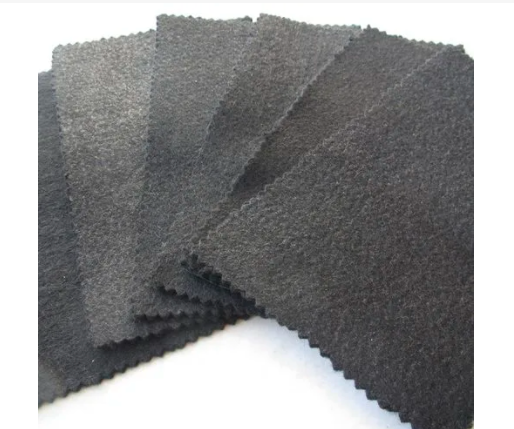- Understanding the Role of Geomembrane Liners in Waste Management
- Innovations in Geomembrane Liners for Water Management
- Geomembrane Liners: A Comprehensive Guide
- The Future of Geomembrane Liners in Civil Engineering
- Geomembrane Liners: Enhancing Landfill Stability
Manager:
WhatsApp:+86 177 0135 2670
Tel:+86 177 0135 2670
Email:marketing@okorder.com
Address:3rd Floor, No.2 Building, No.1 Sanlihe Road
The Unsung Heroes: Non-Woven Double-Punched Geotextile Fabrics
In the complex web of engineering and guardianship of nature, there is a fabric which silently binds the world together. This material is called non-woven double-punched geotextile fabric which is more than mere cloth – it represents our dream to have a sustainable and better future. As we delve into the world of Geotextiles, let's explore this extraordinary fabric on its toughness, innovation and silent strength.
The Backbone of Infrastructure: A Silent Strength
Imagine treading carefully along a well paved path or marveling at the efficiency in a properly designed drainage system. However, under your feet, you will find an unsung hero – non-woven double punched geotextile fabrics. It’s not just any other material but rather, it toughens infrastructure silently acting as support which provides both hardness and flexibility. Manufactured through an intricate process known as double needle punching; it combines exceptional filtration properties with high tensile strength making it invaluable in areas like construction industry through to environmental conservation.
A Mosaic through Time: The History of Geotextiles
The history of geotextiles dates back right from ancient civilization period itself wherein some basic forms of fabrics were used to strengthen their structures and today this leading edge construction method is based on double-punching nonwovens. The development of geotextiles demonstrates man’s ability to make materials that are strong yet adaptability. From ancient Egyptian roads to present-day developmental blueprints for instance, geotextiles have travelled far signifying our never say die culture towards creative innovations for tomorrow’s greenest planet.
Woven versus Non-Woven: A Tale of Two Fabrics
There are two main types of geotextiles: woven and non-woven. Woven ones are very strong plastic cloths with excellent stability thereby making them suitable for reinforcement of soils in embankments because of their high tensile strength. In contrast, non-woven ones are produced using needle punching or thermal bonding techniques, which results in felt-like texture enhancing its permeability and flexibility. Out of all these, the one that is most outstanding is non-woven double-punched geotextile fabric due to its ability to give both strength and flexibility hence it can be applied in many areas.

Applications: A Bazaar of Utility
The non-woven double-punched geotextile fabric is a chameleon in the world of construction and environmental management. Its uses are as varied as the terrains they protect. It shields soils against erosion in drainage systems allowing unimpeded water flow while keeping back the soil particles. It acts as a filter and separator for road construction thereby improving the roads’ performance and durability. These fabrics prevent landscaping from being eroded leading to healthy plant growth and soil steady-state conditions. The versatility of this fabric reveals how useful it can be and how creative its designers have been.
Design Art: Working with Double-Punched Non-woven geotextiles
Working with non-woven double-punched geotextile fabric demands a lot from an artist who must understand well its features and potentialities. This cloth is ideal for applications where one needs both durability and filtering capabilities at once. The design process involves factors such as whether the material is permeable on its own, it’s tensile strength as well as its behavior with regard to surrounding soil-water systems among others.’ Double needling carefully ensures that it is strong but also versatile thus making it fit suitably into different uses.
The Future We Forge: Innovation and Advancements
The non-woven double-punched geotextile fabric is not just a present material but an epitome of our future. This fabric is yet to play a more significant role in the construction and environmental sectors as we keep on innovating and developing. It is presently being researched on to improve its mechanical properties and environmental performance. The resultantly advanced version will widen its areas of use, increase its potentialities and contribute towards more sustainable, resilient infrastructure.
In Stitched Conclusion
Non-woven double-punched geotextile fabric is not only a material but it can be considered as one of many hidden factors that have contributed to the development of our engineering works as well as environment conservation efforts. In contemporary engineering practice this has become crucial due to multiple functions such as filtration, separation of soil, reinforcement of structures among others. As we continue innovating towards finding sustainable solutions, this fabric remains one of the most important things in our quest for building a better world that would last for centuries.
Next time you marvel at a well-built road’s resilience or how effectively a drainage system flows, consider what lies beneath the surface – the non-woven double-punched geotextile fabric, an unseen hero. The existence of this cloth shows human inventiveness and continuous struggles aiming at making global order stronger and sustainable all time. So it means that we do not only make infrastructures but through these materials we create dreams for mankind.
As we step forward into the future, let us not forget the silent strength that lies beneath our feet. It is no longer just about a piece of cloth; it symbolizes our dreamers’ spirit who pioneer new approaches that lead to enhanced living conditions globally.
- Previous:A Pave-ment of Excellence: The Best Geotextile Fabric for Your Gravel Driveway
- Next:The Unsung Heroes: Non-Woven Double-Punched Geotextile Fabrics






